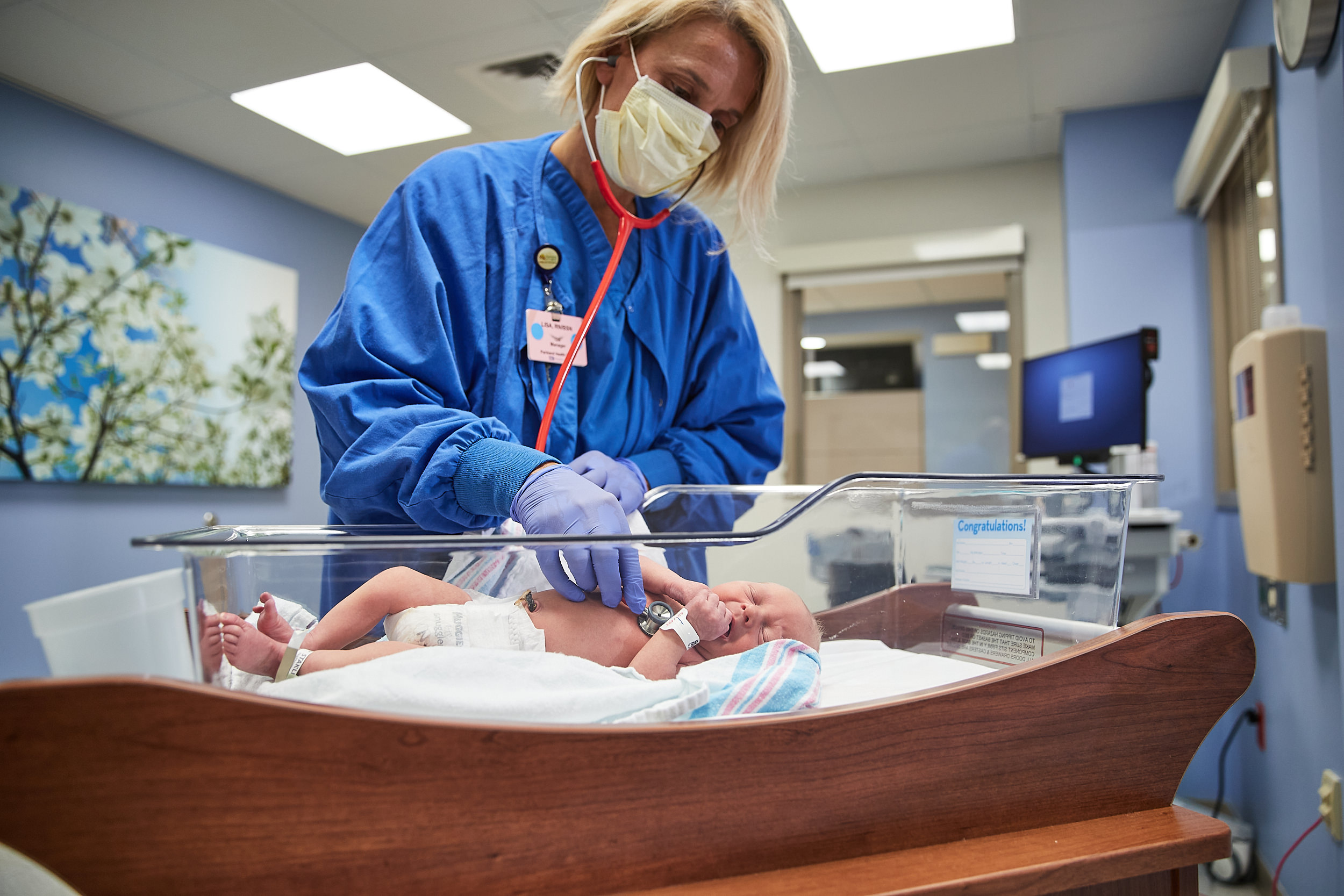
Newborn Assessments and Screenings
Moments after you give birth – and over the course of the next several hours – there are a number of standard assessments and screenings that are performed on your newborn at Parkland Health Center, including:
- A physical exam, which includes obtaining weight, length, head size, chest circumference, temperature and performing a hearing test
- Vitamin K injection to help blood-clotting mechanisms remain normal
- Hepatitis B vaccination
- Administering an antibiotic ointment in your baby’s eyes to prevent bacterial infections
- Performing a heel stick for a blood test of more than 20 inherited conditions such as sickle cell disease, thyroid conditions and phenylketonuria (PKU)
- Performing an Apgar test at one minute and five minutes after birth, evaluating your baby’s heart rate, breathing, activity, muscle tone, reflexes and skin color
Circumcision
If you have a full-term baby boy and choose to have him circumcised, that will often be done by your provider within the first 48 hours after delivery. You’ll be instructed how to change the bandages and keep the area clean so it can properly heal.
Mother-Baby Care and Bonding
Bonding with your newborn is one of the key initial interactions you’ll experience as a new mom. It’s an intensive process that provides your baby with a strong sense of love and security, and ultimately fosters your baby’s social and cognitive development.
We support the bonding process through our mother-baby care approach, beginning shortly after birth with skin-to-skin contact, where your baby (clothed in a diaper and maybe a cap) is placed on your bare chest with a blanket draped over both of you for one to two hours. In addition to boosting the mother-baby bond, skin-to-skin contact offers numerous benefits for your newborn, including:
- Improvement in heart and lung function
- Stabilization of body temperature
- Initiation of breastfeeding
- Reduced crying
- Pain relief from screenings like the heel prick
After a short recovery period from birth, the two of you will be transferred to a mother-baby room for postpartum care, where you’ll begin recovering and continue bonding. Your baby might then be bathed followed by another vitals assessment. We do delayed bathing for newborns (at least four hours after delivery) to ensure temperature stabilization. You and your baby will then room-in together throughout the remainder of your stay, even during the overnight hours. Of course, our nursery is always available if you wish to have a break or take a nap.
Couplet Care
We also provide you and your baby with the same nurse – known as couplet care – throughout your stay to help you feel more comfortable and ensure that both your needs and your baby’s needs are promptly addressed. Your nurse will provide daily care and monitoring throughout your stay, including:
- Tracking breastfeeding and diaper changes
- Checking vital signs and weight
- Keeping your baby’s umbilical cord stump clean and dry
- Monitoring how your baby boy’s circumcision is healing
NICU Support
If your baby experiences any complications that require more intensive care or further evaluation, the neonatologists (newborn specialists) at St. Louis Children’s Hospital, one of our partner hospitals through BJC HealthCare, are only a phone call away through telehealth technology. If more advanced critical care is needed, your baby may be transferred to the Level 4 NICU at St. Louis Children’s Hospital. Through this partnership, we can transfer patients for more advanced care as needed. This is just one more way we’re delivering quality medical care and peace of mind for our expectant moms at Parkland Health Center.
Resources for Life at Home with Baby
As you prepare to return home, it’s important to us that you feel confident about caring for your newborn once you leave the hospital. You’ll likely have lots of questions:
- How often should I feed my baby?
- What position should my baby sleep?
- Should I swaddle my baby?
- When can I give my newborn a bath?
- How long until the umbilical cord stump falls off?
- What should I pack in my baby’s diaper bag?
- How tight should my baby’s car seat straps be?
- Does my baby have acne?
The newborn stage is filled with many surprises, so it’s okay to ask these questions. That’s why we’ve outlined a number of things to help you prepare and better adjust to life at home with your baby, including: